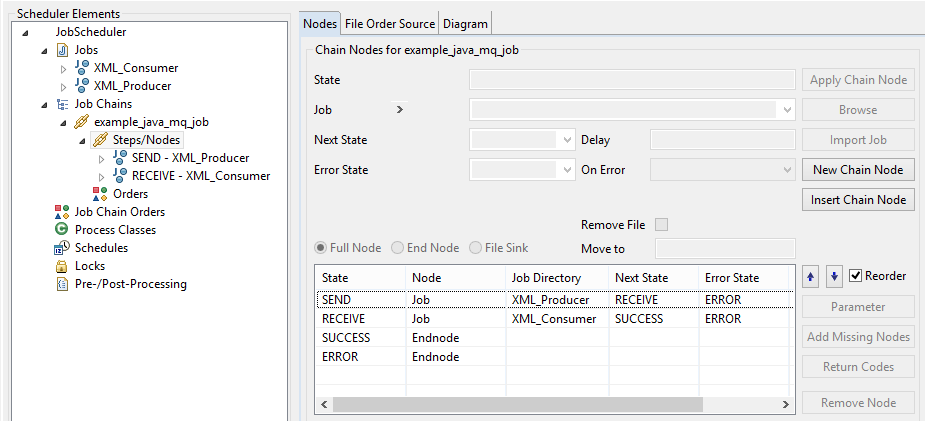Introduction
This article describes how to implement Java jobs that communicate over a Message Queue (MQ). These jobs include a job for publishing and one for receiving and executing JobScheduler API commands.
The document explains which classes and methods have to be created and their purposes. This example was developed with the use of Apache MQ.
Goal of the Example
The example covers the specifics required to achieve the use case described below. It neither covers the complete job API nor the complete possibilities of JMS.
For the coverage of the JobScheduler job API refer to the XML part of the API Documentation.
For the coverage of the JMS API refer to the Oracle Java Documentation.
The Use Case
The use case consists of the following steps:
- Run a Java Job in the JobScheduler which sends an XML fragment to a message queue (MQ)
- Run a Java Job in the JobScheduler which receives an XML fragment from an MQ
- Execute an XML command in the JobScheduler
What does this example explain?
The steps described in this article are as follows:
- How to implement a Java job using the job API
- How to implement a Producer Job
- How to implement a Consumer Job
- How to execute an XML fragment using the job API
- How to deploy the jobs to the JobScheduler
- How to configure the JobScheduler Jobs with JOE using the developed classes
Download
The classes described in this example can be downloaded here.
The job configuration (made with JOE) can be downloaded here.
Prerequisites
The following dependency is needed to write a Java job for the JobScheduler.
- engine-job-api.jar
- The library is hosted on Maven Central. Please download the jar and add it to the classpath of the Java project.
- If the Java project already is a Maven project, simply add the following dependency to the project configuration.
<dependency>
<groupId>com.sos-berlin.jobscheduler.engine</groupId>
<artifactId>engine-job-api</artifactId>
<version>1.10.3</version>
</dependency>
- Make sure to use the correct version suitable for the JobScheduler version in use.
For this example the activemq-all-5.13.0.jar library is used.
- Either download the jar file and add it to the classpath
- or in case of a Maven project add the following dependency to the project configuration.
<dependency>
<groupId>org.apache.activemq</groupId>
<artifactId>activemq-all</artifactId>
<version>5.13.0</version>
</dependency>
The Basic Structure of an API Job Java Class
A Java Job using the JobScheduler API has to extend the Job_impl class.
It has to overwrite the method spooler_process().
public class CLASSNAME extends Job_impl {
@Override
public boolean spooler_process() throws Exception {
// This is the place where the work is done!
return spooler_job.order_queue() != null;
}
}
The Return Value of spooler_process()
If the Java job is an order job, it has to return true for the order to be able to continue with the next task if the job ends without an error.
If the Java job is a standalone job it has to return false for the JobScheduler to be able to recognize that the task has finished.
This can be achieved by using the return value spooler_job.order_queue() != null. It determines if an order is in the queue of the job (true) or not (false).
Logging
Because the Java Jobs run API methods, we can directly use the logging feature of the JobScheduler. As shown in the detailed method examples below, logging is done using the spooler_log method.
Make sure to throw the caught exception in order to hand it over to the spooler_process() method. This is needed for a job running in a job chain to determine that it has to fail if an error occurs.
Initialization of the MQ Connection
Both Java jobs need methods to initialize a connection to an MQ Server. This section of the document shows how to implement them. The implementation is based on the JMS implementation used and shipped by ActiveMQ.
To keep this example simple these methods are put in both Java job classes. To prevent duplicates in a real project´s source code, it is better to put these methods in a single class and extend the class in the two job classes.
The createConnection() method
This method instantiates a ConnectionFactory object with an ActiveMQConnectionFactory object and creates a Connection object through the factory method createConnection().
The ActiveMQConnectionFactory object has to be instantiated with the URL of the MQ server.
public Connection createConnection(String uri){
ConnectionFactory factory = new ActiveMQConnectionFactory(uri);
Connection jmsConnection = null;
try {
jmsConnection = factory.createConnection();
} catch (JMSException e) {
spooler_log.error("JMSException occurred while trying to connect: ");
throw e;
}
return jmsConnection;
}
The createSession(Connection connection) method
The method is called with an already instantiated Connection object and instantiates a Session object through the Connection object´s createSession(boolean transacted, int acknowledgeMode) method.
The acknowledgeMode has the following options among others:
In summary the AUTO_ACKNOWLEDGE mode results in the message be dequeued when one consumer has read the message from the MQ server, whereas the CLIENT_ACKNOWLEDGE puts the responsibility on the client.
When the CLIENT_ACKNOWLEDGE mode is set, the message will stay present for all consumers to read until a consumer acknowledges the message. Only then the message will be dequeued and not be available for further consumers.
private Session createSession(Connection connection) throws JMSException{
Session session = null;
try {
session = connection.createSession(false, Session.CLIENT_ACKNOWLEDGE);
} catch (JMSException e) {
spooler_log.error("JMSException occurred while trying to create Session: ");
throw e;
}
return session;
}
The createDestination(Session session, String queueName) method
This method creates a Destination object. It is called with an active Session object and the name of the queue to write to. The Destination object is initiated through the createQueue(String name) method of the Session object.
private Destination createDestination(Session session, String queueName) throws JMSException{
Destination destination = null;
try {
destination = session.createQueue(queueName);
} catch (JMSException e) {
spooler_log.error("JMSException occurred while trying to create Destination: ");
throw e;
}
return destination;
}
The createConnectionUrl (String protocol, String hostName, String port) method
This is a helper method which creates a connection URI based on the job parameters. It simply uses a StringBuilder to create a string in the format [protocol]://[hostname]:[port].
private String createConnectionUrl (String protocol, String hostName, String port){
StringBuilder strb = new StringBuilder();
strb.append(protocol).append("://").append(hostName).append(":").append(port);
return strb.toString();
}
Implementation of the Producer Job
There are three more methods needed for the producer Java job to run:
createMessageProducer(Session session, Destination destination)write(String text, String connectionUrl, String queueName)execute()
The createMessageProducer(Session session, Destination destination) method
This method is called with an already active Session object as well as an instantiated Destination object. It instantiates a MessageProducer object with the given session and destination.
public MessageProducer createMessageProducer(Session session, Destination destination) throws JMSException{
MessageProducer producer = null;
try {
producer = session.createProducer(destination);
} catch (JMSException e) {
spooler_log.error("JMSException occurred while trying to create MessageProducer: ");
throw e;
}
return producer;
}
The write(String text, String connectionUrl, String queueName) method
The method is called with the message to be sent to the server, the connection URL to the server and the queue name to be used for publishing. The message is a String object. The method instantiates a Message object with the text to send. This method makes use of the methods described above. It instantiates all objects needed for the connection and sends a Message object. Also the methods throws an error if one occurs. Although this method may throw an error, it still calls the MessageProducer´s send(Message message) method in a try..catch..finally block. That is because the finally block is used to close the connection in the end.
public void write(String text, String connectionUrl, String queueName) throws JMSException{
Connection connection = createConnection(connectionUrl);
Session session = createSession(connection);
Destination destination = createDestination(session, queueName);
MessageProducer producer = createMessageProducer(session, destination);
Message message = null;
try {
message = session.createTextMessage(text);
producer.send(message);
} catch (JMSException e) {
spooler_log.error("JMSException occurred in ProducerJob while trying to write Message to Destination: ");
throw e;
} finally {
if (connection != null) {
try {
connection.close();
} catch (JMSException e) {
spooler_log.error("JMSException occurred in ProducerJob while trying to close the connection: ");
throw e;
}
}
}
}
The execute() method
This is the core method of the Producer Java job. It reads the parameters from the task and order, does some logging at debug level, calls the createConnectionUrl(..) method and subsequently calls the write(..) method to send the message to the MQ server.
private void execute() throws Exception {
Variable_set params = spooler_task.params();
params.merge(spooler_task.order().params());
spooler_log.debug9(params.xml());
String protocol = spooler_task.params().value("MQ_Protocol");
spooler_log.debug9("Received protocol: " + protocol);
String messageHost = spooler_task.params().value("MQ_Host");
spooler_log.debug9("Received MQ Host: " + messageHost);
String messagePort = spooler_task.params().value("MQ_Port");
spooler_log.debug9("Received MQ port: " + messagePort);
String queueName = spooler_task.params().value("MQ_QueueName");
spooler_log.debug9("Received Queue name: " + queueName);
String message = spooler_task.params().value("message");
spooler_log.debug9("Received message: " + message);
if(protocol == null || (protocol != null && protocol.isEmpty())){
protocol = DEFAULT_PROTOCOL;
}
if(queueName == null || (queueName != null && queueName.isEmpty())){
queueName = DEFAULT_QUEUE_NAME;
}
String connectionUrl = createConnectionUrl(protocol, messageHost, messagePort);
if(message != null && !message.isEmpty()){
write(message, connectionUrl, queueName);
} else {
spooler_log.error("Message is empty, nothing to send to message server");
}
}
Putting the Bricks Together
The last thing to do is to call the execute() method in spooler_process() as shown in the complete code example below.
package com.sos.jitl.messaging;
import javax.jms.Connection;
import javax.jms.ConnectionFactory;
import javax.jms.Destination;
import javax.jms.JMSException;
import javax.jms.Message;
import javax.jms.MessageProducer;
import javax.jms.Session;
import org.apache.activemq.ActiveMQConnectionFactory;
import sos.spooler.Job_impl;
import sos.spooler.Variable_set;
public class MessageProducerExampleJob extends Job_impl {
private static final String DEFAULT_QUEUE_NAME = "JobChainQueue";
private static final String DEFAULT_PROTOCOL = "tcp";
@Override
public boolean spooler_process() throws Exception {
try {
execute();
} catch (Exception e) {
spooler_log.error("Error occured in spooler_process() of MessageProducerExampleJob: ");
throw e;
}
return spooler_job.order_queue() != null;
}
private void execute() throws Exception {
Variable_set params = spooler_task.params();
params.merge(spooler_task.order().params());
spooler_log.debug9(params.xml());
String protocol = spooler_task.params().value("MQ_Protocol");
spooler_log.debug9("Received protocol: " + protocol);
String messageHost = spooler_task.params().value("MQ_Host");
spooler_log.debug9("Received MQ Host: " + messageHost);
String messagePort = spooler_task.params().value("MQ_Port");
spooler_log.debug9("Received MQ port: " + messagePort);
String queueName = spooler_task.params().value("MQ_QueueName");
spooler_log.debug9("Received Queue name: " + queueName);
String message = spooler_task.params().value("message");
spooler_log.debug9("Received message: " + message);
if(protocol == null || (protocol != null && protocol.isEmpty())){
protocol = DEFAULT_PROTOCOL;
}
if(queueName == null || (queueName != null && queueName.isEmpty())){
queueName = DEFAULT_QUEUE_NAME;
}
String connectionUrl = createConnectionUrl(protocol, messageHost, messagePort);
if(message != null && !message.isEmpty()){
write(message, connectionUrl, queueName);
} else {
spooler_log.error("Message is empty, nothing to send to message server");
}
}
private String createConnectionUrl (String protocol, String hostName, String port){
StringBuilder strb = new StringBuilder();
strb.append(protocol).append("://").append(hostName).append(":").append(port);
return strb.toString();
}
private Connection createConnection(String uri) throws JMSException{
ConnectionFactory factory = new ActiveMQConnectionFactory(uri);
Connection jmsConnection = null;
try {
jmsConnection = factory.createConnection();
} catch (JMSException e) {
spooler_log.error("JMSException occurred while trying to connect: ");
throw e;
}
return jmsConnection;
}
private Session createSession(Connection connection) throws JMSException{
Session session = null;
try {
session = connection.createSession(false, Session.CLIENT_ACKNOWLEDGE);
} catch (JMSException e) {
spooler_log.error("JMSException occurred while trying to create Session: ");
throw e;
}
return session;
}
private Destination createDestination(Session session, String queueName) throws JMSException{
Destination destination = null;
try {
destination = session.createQueue(queueName);
} catch (JMSException e) {
spooler_log.error("JMSException occurred while trying to create Destination: ");
throw e;
}
return destination;
}
public MessageProducer createMessageProducer(Session session, Destination destination) throws JMSException{
MessageProducer producer = null;
try {
producer = session.createProducer(destination);
} catch (JMSException e) {
spooler_log.error("JMSException occurred while trying to create MessageProducer: ");
throw e;
}
return producer;
}
public void write(String text, String connectionUrl, String queueName) throws JMSException{
Connection connection = createConnection(connectionUrl);
Session session = createSession(connection);
Destination destination = createDestination(session, queueName);
MessageProducer producer = createMessageProducer(session, destination);
Message message = null;
try {
message = session.createTextMessage(text);
producer.send(message);
} catch (JMSException e) {
spooler_log.error("JMSException occurred in ProducerJob while trying to write Message to Destination: ");
throw e;
} finally {
if (connection != null) {
try {
connection.close();
} catch (JMSException e) {
spooler_log.error("JMSException occurred in ProducerJob while trying to close the connection: ");
throw e;
}
}
}
}
}
Implementation of the Consumer Job
As seen above in the Producer Job example, there are also additional methods needed for the consumer Java job to run.
createMessageConsumer(Session session, Destination destination)read(Connection connection, String queueName, Boolean closeMessage)executeXml(String message)executeXmlForAllTargets(String message)execute()
The createMessageConsumer(Session session, Destination destination) method
This method is called with an already active Session object as well as an instantiated Destination object. It instantiates a MessageConsumer object with the given session and destination.
private MessageConsumer createMessageConsumer(Session session, Destination destination) throws JMSException {
MessageConsumer consumer = null;
try {
consumer = session.createConsumer(destination);
} catch (JMSException e) {
spooler_log.error("JMSException occurred while trying to create MessageConsumer: ");
throw e;
}
return consumer;
}
The read(Connection connection, String queueName, Boolean closeMessage) method
The method is called with an already instantiated Connection object, the name of the queue to read from and a flag to determine if this is the last consumer. If it is the last consumer for the messages in the specified queue then the received message will be acknowledged. This method makes use of the methods described above. It instantiates all objects needed for the connection and reads a Message object from the given queue. It extracts the value from the Message object as a string representation via the Message object´s getText() method. We have to make sure that connection.start() is called before the MessageConsumer object is instantiated.
private String read(Connection connection, String queueName, Boolean closeMessage) throws JMSException {
String messageText = null;
try {
Session session = createSession(connection);
Destination destination = createDestination(session, queueName);
connection.start();
MessageConsumer consumer = createMessageConsumer(session, destination);
Message receivedMessage = null;
while (true) {
receivedMessage = consumer.receive(1);
if (receivedMessage != null) {
if (receivedMessage instanceof TextMessage) {
TextMessage message = (TextMessage) receivedMessage;
messageText = message.getText();
break;
} else {
break;
}
}
}
if(closeMessage){
receivedMessage.acknowledge();
}
} catch (JMSException e) {
spooler_log.error("JMSException occurred while trying to read from Destination: ");
throw e;
} finally {
if (connection != null) {
try {
connection.close();
} catch (JMSException e) {
spooler_log.error("JMSException occurred while trying to close the connection: ");
}
}
}
return messageText;
}
The executeXml(String message) method
This method gets the received message and sends it through the spooler.executeXml(String text) API method with additional debug information.
private void executeXml(String message) {
spooler_log.debug9("execute XML started");
String answer = spooler.execute_xml(message);
spooler_log.debug9("Return value of executeXML: " + answer);
spooler_log.debug9("execute XML finished");
}
The executeXmlForAllTargets(String message) method
This method calls the executeXml(String message) method mentioned above for each given target job chain. It replaces the job_chain argument of the (XML) message with the given job chain names from the job parameter.
private void executeXmlForAllTargets(String message) {
if (targetJobChains.contains(DELIMITER) && message.contains("add_order")) {
String [] jobChainNames = targetJobChains.split("[" + DELIMITER + "]");
for (String name : jobChainNames){
spooler_log.debug9("add_order XML will be adjusted for JobChain: " + name);
executeXml(message.replaceFirst("job_chain='[^']*'", "job_chain='" + name + "'"));
}
}else{
executeXml(message);
}
}
The execute() method
This is the core method of the Producer Java job. It reads the parameters from the task and order, does some logging at debug level, calls the createConnectionUrl(..) method and subsequently calls the read(..) method. The received message as well as the name(s) of the target job chain(s) are stored globally in the class for further processing.
private void execute() throws Exception {
Variable_set params = spooler_task.params();
params.merge(spooler_task.order().params());
spooler_log.debug9(params.xml());
String protocol = params.value("MQ_Protocol");
spooler_log.debug9("Received protocol: " + protocol);
if(protocol == null || (protocol != null && protocol.isEmpty())){
protocol = DEFAULT_PROTOCOL;
}
String messageHost = params.value("MQ_Host");
spooler_log.debug9("Received MQ Host: " + messageHost);
String messagePort = params.value("MQ_Port");
spooler_log.debug9("Received MQ port: " + messagePort);
String queueName = params.value("MQ_QueueName");
spooler_log.debug9("Received Queue name: " + queueName);
Boolean lastConsumer = Boolean.valueOf(params.value("lastConsumer"));
spooler_log.debug9("Received lastConsumer: " + lastConsumer.toString());
if(queueName == null || (queueName != null && queueName.isEmpty())){
queueName = DEFAULT_QUEUE_NAME;
}
targetJobChains = params.value("targetJobChainName");
spooler_log.debug9("Received targetJobChains: " + targetJobChains);
String connectionUrl = createConnectionUrl(protocol, messageHost, messagePort);
Connection jmsConnection = createConnection(connectionUrl);
messageXml = read(jmsConnection, queueName, lastConsumer);
spooler_log.debug9("Received message: " + messageXml);
}
Putting the Bricks Together
The last thing to do is for the Consumer Job is to call the execute() method as well as the executeXmlForAllTargets(String message) method in spooler_process(), as shown in the complete code example below.
package com.sos.jitl.messaging;
import javax.jms.Connection;
import javax.jms.ConnectionFactory;
import javax.jms.Destination;
import javax.jms.JMSException;
import javax.jms.Message;
import javax.jms.MessageConsumer;
import javax.jms.Session;
import javax.jms.TextMessage;
import org.apache.activemq.ActiveMQConnectionFactory;
import sos.spooler.Job_impl;
import sos.spooler.Variable_set;
public class MessageConsumerExampleJob extends Job_impl {
private static final String DEFAULT_QUEUE_NAME = "JobChainQueue";
private static final String DEFAULT_PROTOCOL = "tcp";
private static final String DELIMITER = ",";
private String messageXml;
private String targetJobChains;
@Override
public boolean spooler_process() throws Exception {
try {
execute();
executeXmlForAllTargets(messageXml);
} catch (Exception e) {
spooler_log.error("Error occured in spooler_process() of MessageConsumerTestJob: ");
throw e;
}
return spooler_job.order_queue() != null;
}
private void execute() throws Exception {
Variable_set params = spooler_task.params();
params.merge(spooler_task.order().params());
spooler_log.debug9(params.xml());
String protocol = params.value("MQ_Protocol");
spooler_log.debug9("Received protocol: " + protocol);
if(protocol == null || (protocol != null && protocol.isEmpty())){
protocol = DEFAULT_PROTOCOL;
}
String messageHost = params.value("MQ_Host");
spooler_log.debug9("Received MQ Host: " + messageHost);
String messagePort = params.value("MQ_Port");
spooler_log.debug9("Received MQ port: " + messagePort);
String queueName = params.value("MQ_QueueName");
spooler_log.debug9("Received Queue name: " + queueName);
Boolean lastConsumer = Boolean.valueOf(params.value("lastConsumer"));
spooler_log.debug9("Received lastConsumer: " + lastConsumer.toString());
if(queueName == null || (queueName != null && queueName.isEmpty())){
queueName = DEFAULT_QUEUE_NAME;
}
targetJobChains = params.value("targetJobChainName");
spooler_log.debug9("Received targetJobChains: " + targetJobChains);
String connectionUrl = createConnectionUrl(protocol, messageHost, messagePort);
Connection jmsConnection = createConnection(connectionUrl);
messageXml = read(jmsConnection, queueName, lastConsumer);
spooler_log.debug9("Received message: " + messageXml);
}
private String createConnectionUrl (String protocol, String hostName, String port){
StringBuilder strb = new StringBuilder();
strb.append(protocol).append("://").append(hostName).append(":").append(port);
return strb.toString();
}
private Connection createConnection(String uri) throws JMSException{
ConnectionFactory factory = new ActiveMQConnectionFactory(uri);
Connection jmsConnection = null;
try {
jmsConnection = factory.createConnection();
} catch (JMSException e) {
spooler_log.error("JMSException occurred while trying to connect: ");
throw e;
}
return jmsConnection;
}
private Session createSession(Connection connection) throws JMSException{
Session session = null;
try {
session = connection.createSession(false, Session.CLIENT_ACKNOWLEDGE);
} catch (JMSException e) {
spooler_log.error("JMSException occurred while trying to create Session: ");
throw e;
}
return session;
}
private Destination createDestination(Session session, String queueName) throws JMSException{
Destination destination = null;
try {
destination = session.createQueue(queueName);
} catch (JMSException e) {
spooler_log.error("JMSException occurred while trying to create Destination: ");
throw e;
}
return destination;
}
private MessageConsumer createMessageConsumer(Session session, Destination destination) throws JMSException {
MessageConsumer consumer = null;
try {
consumer = session.createConsumer(destination);
} catch (JMSException e) {
spooler_log.error("JMSException occurred while trying to create MessageConsumer: ");
throw e;
}
return consumer;
}
private String read(Connection connection, String queueName, Boolean closeMessage) throws JMSException {
String messageText = null;
try {
Session session = createSession(connection);
Destination destination = createDestination(session, queueName);
connection.start();
MessageConsumer consumer = createMessageConsumer(session, destination);
Message receivedMessage = null;
while (true) {
receivedMessage = consumer.receive(1);
if (receivedMessage != null) {
if (receivedMessage instanceof TextMessage) {
TextMessage message = (TextMessage) receivedMessage;
messageText = message.getText();
break;
} else {
break;
}
}
}
if(closeMessage){
receivedMessage.acknowledge();
}
} catch (JMSException e) {
spooler_log.error("JMSException occurred while trying to read from Destination: ");
throw e;
} finally {
if (connection != null) {
try {
connection.close();
} catch (JMSException e) {
spooler_log.error("JMSException occurred while trying to close the connection: ");
}
}
}
return messageText;
}
private void executeXml(String message) {
spooler_log.debug9("execute XML started");
String answer = spooler.execute_xml(message);
spooler_log.debug9("Return value of executeXML: " + answer);
spooler_log.debug9("order sent");
}
private void executeXmlForAllTargets(String message) {
if (targetJobChains.contains(DELIMITER) && message.contains("add_order")) {
String [] jobChainNames = targetJobChains.split("[" + DELIMITER + "]");
for (String name : jobChainNames){
spooler_log.debug9("add_order XML will be adjusted for JobChain: " + name);
executeXml(message.replaceFirst("job_chain='[^']*'", "job_chain='" + name + "'"));
}
}else{
executeXml(message);
}
}
}
Deploy the Java Classes to the JobScheduler
To be able to run the new Java jobs simply deploy/copy the created jar library to the user_lib folder in your $SCHEDULER_HOME.
Configuring the Jobs in JOE
This section shows the creation of an example job chain to run both jobs.
Create the Producer Job in JOE
Create a new Job and write the class name including the package structure in the Classname field. Let´s call the job XML_Producer after the example's use case.
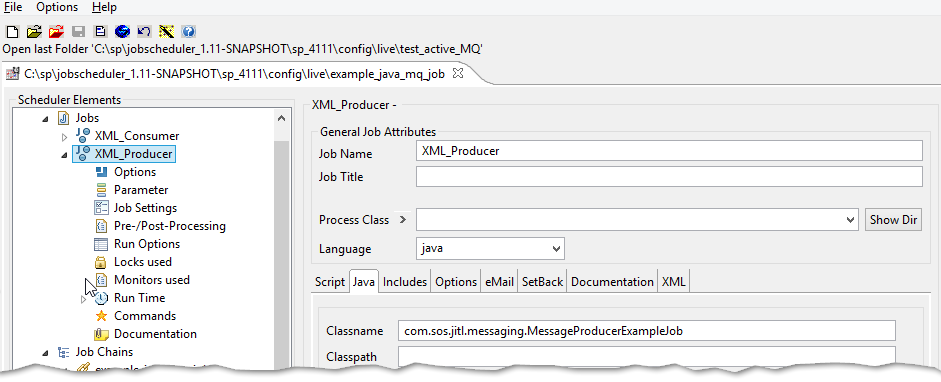
Configure the parameters for the job as shown below.
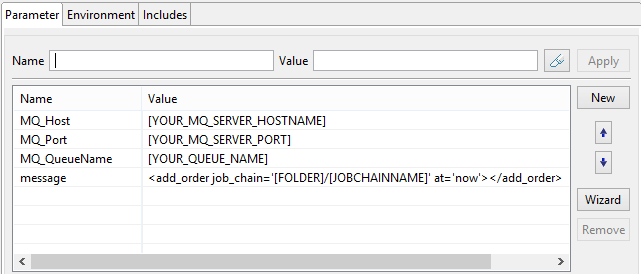
Create the Consumer Job in JOE
Create a new Job and write the class name including the package structure in the Classname field. Let´s call the job XML_Consumer after the example's use case.
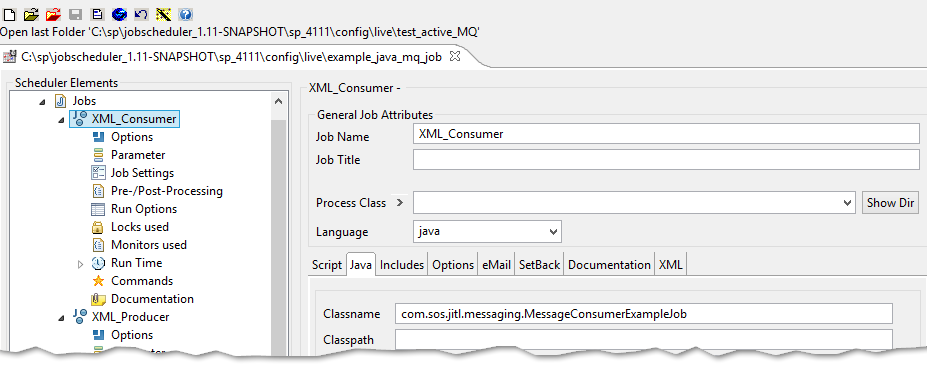
Configure the parameters for the job as shown below.
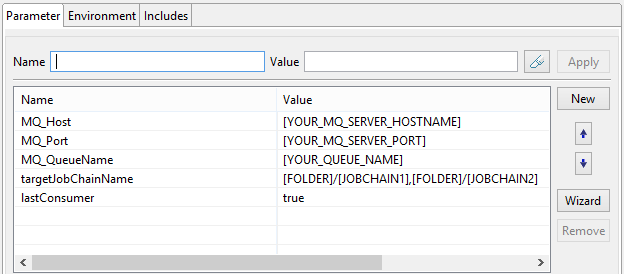
The targetJobChainName parameter is only needed if you want to change the configuration as shown in the message parameter of the producer job.
Create the Job Chain with JOE
This job chain configuration has been written to show the processing of the job - therefore both jobs are put in the same job chain. In a production environment it is more likely that both jobs would reside in different job chains, that there is more than one consumer, etc...
Create a job chain which looks like the example below.
